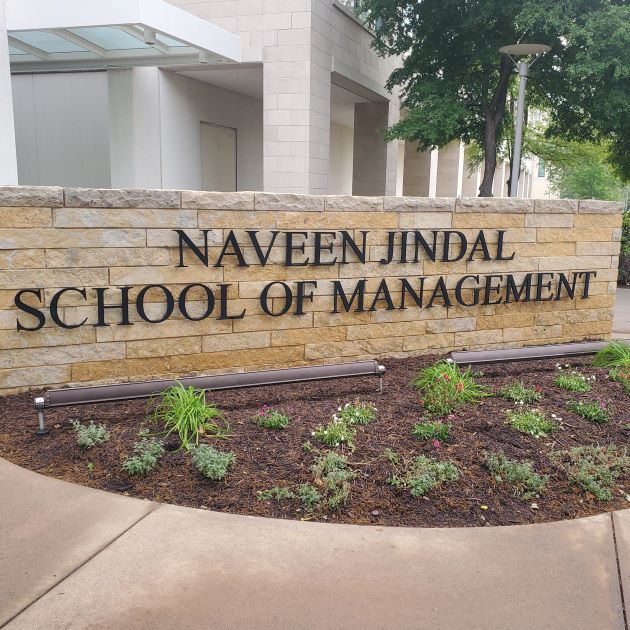
In an era of rising workplace conflict and communication breakdowns, a new professional certificate from the Naveen Jindal School of Management equips professionals with the tools to resolve disputes with skill and empathy.
Housed within the Organizational Behavior, Coaching and Consulting (OBCC) department in the Jindal School’s Executive Education division, the 40-hour, fully interactive Professional Certificate in Mediation and Dispute Resolution will be taught by Nancy Boyle, a Texas Mediator Credentialing Association (TMCA) Credentialed Distinguished Mediator.
Classes begin Sept. 22 and run through Oct. 20. The course will be conducted via Zoom.

Nancy Boyle, the program instructor, emphasizes the gap between how conflict is typically handled in the real world and how people are prepared to address it.
“Too often, individuals are conditioned to either avoid conflict or confront it aggressively, without ever learning how to engage with it constructively,” she said.

Olga Malinowska, the program director, said successful completion of the certificate can support a wide range of professional transitions for participants, including becoming a formal mediator or simply bringing conflict management skills into their current roles.
“These skills are increasingly essential in fields like law, education, public service, business, human resources and community engagement,” she said. “Students will leave better equipped to handle conflict with confidence and clarity, making them valuable contributors in any setting that benefits from ethical dialogue, structured decision-making, and effective communication.”
The program’s 40-hour format was selected to align with the TMCA standards for basic mediation training. Unlike many self-paced online courses that lack real-time engagement and are ineligible for TMCA credentialing, OBCC’s program enables participants to apply for a TMCA Credential immediately upon completion.
In addition, this program is a valuable opportunity for legal and human resource professionals who want to pursue continued professional development. It offers:
- 5 hours of Continuing Legal Education (CLE) — State Bar of Texas
- Recertification credits — Society for Human Resource Management
- Recertification credits — HR Certification Institute.
Boyle said that rising interpersonal stressors, overloaded court systems and communication breakdowns in various sectors inspired the creation of this program, emphasizing the need for more thoughtful, effective approaches to dispute resolution.
“This program is designed to help students understand both the practical techniques and the deeper values behind mediation — like empathy, agency, and informed decision-making — so they can contribute meaningfully to healthier conflict engagement in any setting,” she said.
Many mediation training programs rely heavily on rigid models or theoretical frameworks without preparing students for the complex, emotionally nuanced nature of real-world disputes Boyle emphasized.
“This program bridges that gap by combining hands-on, reflective practice with theory,” she said. “It is grounded in real practice systems theory, ethical decision-making and real-time communication skills that reflect the dynamic conditions mediators often face. The course also provides practical tools, real case studies, and simulation experiences that align closely with how mediation actually unfolds in diverse contexts.”
“The course length allows for both breadth and depth, ensuring that students gain foundational knowledge while also developing practical skills through simulations, role plays, and feedback,” Boyle said. “It meets credentialing expectations by covering essential elements like ethics, process design, communication techniques, and mediator responsibilities in a structured, interactive format.”
Students will build both a theoretical foundation and practical mediation skills through a mix of hands-on projects, case studies, and professional tools. Simulated mediations, ethical dilemma analyses and party decision-making portfolios allow students to apply key concepts in realistic, emotionally complex scenarios, Boyle said.
“Students will practice everything from conversation management to ethical decision-making,” she said. “Annotated case reviews will help students better understand how mediation outcomes are shaped by communication dynamics and ethical decisions. Tools like Real Practice Systems (RPS) checklists and Process Design Templates will equip them with strategies used by practicing mediators and attorneys. This integrated approach ensures students move beyond theory into the nuanced work of conflict resolution.”
Boyle said role-play and simulation exercises are at the heart of the program’s hands-on learning approach.
“Students will take on the roles of mediator, party and attorney in realistic scenarios, practicing key skills such as building rapport, managing difficult conversations and guiding decision-making,” she said. “Through these simulations, they learn how to help participants assess potential outcomes, navigate impasse and arrive at workable solutions.”
The program emphasizes the effective use of language, fostering participant agency and self-determination and facilitating values-based decision-making throughout the process, Boyle explained.
“These activities help students become comfortable navigating emotionally charged, high-stakes situations,” she said. “I will provide ongoing real-time feedback — as will the peer participants. We will provide insights on communication style, clarity, process management, and ethical considerations. This approach strengthens their ability to adapt and grow in real-time.”
In addition to the live feedback, participants will receive both structured and informal feedback throughout the training.
“The emphasis is on fostering a supportive learning environment where feedback is used to build confidence and deepen practical competence,” Boyle said.
Malinowska said the program will not only equip participants with the resources and insights needed to thrive in complex conflict environments, it also invites students to fundamentally rethink how they approach conflict, communication, and decision-making.
“The curriculum supports meaningful shifts in how participants navigate both professional and personal interactions,” she said. “Its live, interactive format encourages peer engagement and professional networking, with many of these connections continuing through the broader OBCC community. Alumni also gain ongoing access to virtual expert forums that we offer regularly on topics such as coaching, consulting, leadership, mediation, and conflict resolution — at no additional cost.”
Registration is currently open for the online course with a Sept. 1 application deadline. An information session will be offered May 29 for those wanting to learn more about the program and meet the instructor. Other information sessions are planned for July 16 and Aug. 2.





